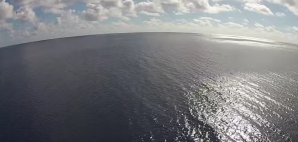A Time for Sea Change
 Video still from "A Time for Sea Change"
Video still from "A Time for Sea Change" A Time for Sea Change
In the lead-up to the Paris climate talks, Center for Ocean Solutions experts explain why reducing carbon dioxide emissions is vital to both human and ocean health.
Climate change and our global ocean are integrally connected. Any discussion about mitigating the impacts of climate change, therefore, must consider how to protect our ocean and the critical resources and functions its ecosystems provide for human society.
This is the argument raised by five ocean science leaders in a new video, "A Time for Sea Change," produced by the Center for Ocean Solutions. As the United Nations Convention on Climate Change (a.k.a. the Paris climate talks or COP21) gets underway this week, ocean scientists want to be sure that any agreed-upon greenhouse gas emissions reductions are strong enough to reduce the major threats to our oceans—including temperature increases, sea level rise and ocean acidification.
The ocean is already experiencing dramatic change; tropical species are shifting north as waters warm, shelled organisms are struggling in more acidic waters, and coastlines are shrinking where rising sea levels are encroaching. We depend on the ocean not only for food and coastal protection, but also for the very air we breathe—nearly half the oxygen we breathe is produced by ocean phytoplankton.
In the video, experts, including Woods Senior Fellows Larry Crowder (Biology), Rob Dunbar (Earth System Science) and Steve Palumbi (Biology), discuss the link between climate and oceans, and why the oceans need to be part of any conversation about climate change. The time to reduce our carbon footprint in now so we can ensure the health of our oceans into the future.
